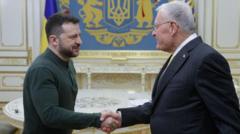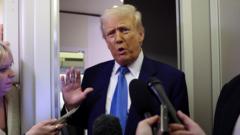**The U.S. continues to exert influence on Middle Eastern diplomacy, as King Abdullah wrestles with the implications of Trump's controversial refugee proposal on Jordan's political landscape.**
**Trump’s Demands Put Jordan’s King in a Tough Spot Ahead of Meeting**

**Trump’s Demands Put Jordan’s King in a Tough Spot Ahead of Meeting**
**King Abdullah II faces pressure from President Trump to accept Palestinian refugees amidst domestic political challenges in Jordan.**
In a politically charged atmosphere, King Abdullah II of Jordan finds himself at a crossroads as he prepares to meet with President Trump. The meeting, scheduled for Tuesday, comes at a time when Trump has made it clear that he expects Jordan to take in around 1.9 million Palestinians from Gaza. The proposal is part of his broader strategy to exert U.S. control over the region, which has provoked significant concern for the Jordanian monarch.
This isn't the first time Jordan has been asked to shoulder a heavy burden in the realm of Middle Eastern politics. In previous administrations, support for Jordan’s role as a stabilizing force in the region has been crucial; however, the current expectation from Trump comes wrapped in the threat of reduced financial aid. The United States contributes over $1.5 billion annually in aid to Jordan, a figure that includes critical funding for its intelligence services.
King Abdullah's domestic political landscape is vastly complicated by the demographics of his nation; a sizable portion of Jordan's population is of Palestinian descent. This reality makes the potential acceptance of new Palestinian refugees a divisive issue that could threaten the king's authority if perceived as capitulating to external pressure.
In addition to the domestic ramifications, any lack of cooperation with Trump's demands might lead to adverse effects on foreign aid, a lifeline for Jordan's economy. Past precedents suggest that U.S. assistance could be withheld, introducing further instability into a country that has been a steadfast ally to the West.
As Abdullah engages with international stakeholders, he must navigate a complex scenario where his allegiance to U.S. policy clashes with the expectations and identity of his own people. Historical ties between the U.S. and Jordan emphasize the longstanding collaboration centered around regional security, yet the current scenario presents an unprecedented challenge for the king. The dynamics of the upcoming meeting will likely reflect the delicate balance between external pressures and internal stability for Jordan.
This isn't the first time Jordan has been asked to shoulder a heavy burden in the realm of Middle Eastern politics. In previous administrations, support for Jordan’s role as a stabilizing force in the region has been crucial; however, the current expectation from Trump comes wrapped in the threat of reduced financial aid. The United States contributes over $1.5 billion annually in aid to Jordan, a figure that includes critical funding for its intelligence services.
King Abdullah's domestic political landscape is vastly complicated by the demographics of his nation; a sizable portion of Jordan's population is of Palestinian descent. This reality makes the potential acceptance of new Palestinian refugees a divisive issue that could threaten the king's authority if perceived as capitulating to external pressure.
In addition to the domestic ramifications, any lack of cooperation with Trump's demands might lead to adverse effects on foreign aid, a lifeline for Jordan's economy. Past precedents suggest that U.S. assistance could be withheld, introducing further instability into a country that has been a steadfast ally to the West.
As Abdullah engages with international stakeholders, he must navigate a complex scenario where his allegiance to U.S. policy clashes with the expectations and identity of his own people. Historical ties between the U.S. and Jordan emphasize the longstanding collaboration centered around regional security, yet the current scenario presents an unprecedented challenge for the king. The dynamics of the upcoming meeting will likely reflect the delicate balance between external pressures and internal stability for Jordan.






















